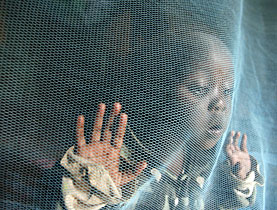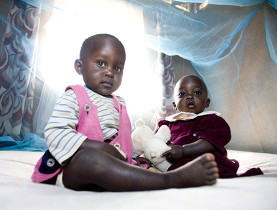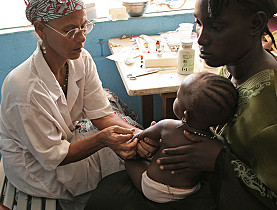Malaria battle needs joint action

Combating the scourge of malaria requires more money from wealthy countries like Switzerland and the pooling of the best available countermeasures, experts say.
More than a century has passed since scientists figured out what causes the disease, but malaria is far from being eradicated, infecting around 250 million people every year and killing one million, mainly children.
To coincide with World Malaria Day on Saturday, the Swiss Malaria Group (SMG) has called on all agencies involved in malaria control to join forces in the fight against the disease.
The SMG urged the Swiss government to provide more funding as it is lagging behind the diverse projects by Swiss companies, non-governmental and academic backers.
“Switzerland is actually incredibly active in the fight against malaria. It is on a par with Britain and the United States in terms of its activities,” Christian Lengeler, of the Swiss Tropical Institute and representative of SMG, told swissinfo.
Swiss-based firms Novartis, the most important global producer of anti-malaria drugs, Syngenta, number two for anti-malaria insecticides, and Vestergaard Frandsen, number one for mosquito nets, are all part of SMG, along with the Swiss Tropical Institute – one of the top five academic research institutions into malaria.
“These are all initiatives from private and non-governmental organisations. We would like to encourage the government of Switzerland to reinforce its investment in this area,” said Lengeler.
“The financing of malaria control at a global level has gone up tremendously in recent years but it is still very fragile and it needs rich countries like Switzerland to make additional efforts. We are well below what we should be giving if you compare it with our wealth.”
Swiss support to the biggest pool of aid money, the Global Fund to Fight Aids, Tuberculosis and Malaria, averaged at $6 million (SFr6.8 million) a year for the last six years, ahead of Luxembourg, but well behind Belgium’s $20 million.
Switzerland’s annual contribution should be closer to $40 million according to a Swiss representative to the fund.
Saving lives
Lengeler says the group’s “brand” offers “an incredibly good investment” in terms of saving lives and improving the socio-economic status of countries. SMG estimates its collective efforts and products saved up to 200,000 lives, mostly children, last year.
Lengeler adds that malaria – widespread in tropical and subtropical regions including parts of the Americas, Asia and Africa – is not just a problem for the residents of countries affected.
Hundreds of Swiss travellers pick up the disease every year.
In addition health and malaria control are included in Switzerland’s development aid strategy.
Malaria has been in the shadow of HIV/Aids for decades but is once again considered a major health issue, with the number of deaths doubling over the past 20 years in sub-Saharan Africa, the worst affected region.
It costs African economies an estimated $12 billion a year.
Silver bullet
The BioVision Foundation shares the view that increased cooperation is necessary to help root out malaria.
The Swiss NGO has ploughed its efforts into projects led by the Kenyan-based International Centre of Insect Physiology and Ecology, which combine environmentally-friendly and holistic methods to fight malaria, starting at breeding grounds for the disease.
Andreas Schriber of BioVision argues that although these methods are time-consuming and not a quick-fix solution, they are efficient.
“We have to tackle malaria from different angles and sides,” he told swissinfo.
“A strategic approach is not just about one component. It is not just done with bed nets, medication or with spraying mosquitoes. You really have to tackle it in a combined and sustainable way.”
BioVision want to see a move away from single solution approaches, many of which are donor driven.
“It would be great to have a ‘silver bullet’. But for 100 years now we have known what causes malaria. For 50 years we have tried to eradicate it. It all failed. Waiting another decade to maybe find a vaccination that works is not an option. Why not go back and have a look at what we have at hand?”
swissinfo, Jessica Dacey
The World Health Organization (WHO) estimates that nearly 250 million people get malaria every year, and it kills almost one million, of which 90% are children under the age of five.
Malaria is caused by a parasite of the Plasmodium species and is transmitted by the bite of a female Anopheles mosquito. Many drugs have lost their effectiveness against the parasite as it adapts. There is no vaccine but advanced testing is underway of one that could offer partial protection.
Insecticide-treated bed nets and indoor spraying of houses with insecticides are two methods of keeping the Anopheles mosquito at bay. Currently, the most effective drugs are combination treatments containing artemisinin – derived from a plant that has been used for centuries in traditional Chinese medicine to treat fever. One such drug is Coartem.
Malaria has been largely beaten in the richer parts of the world, with 108 countries free from the disease, but tackling the disease in poor and tropical countries is more difficult.
A series of anti-malaria initiatives was announced to mark World Malaria Day.
Leaders in the fight against the disease, African and American faith leaders gathered for a malaria summit on Friday. The US said it was committed to becoming the world leader in ending related deaths by 2015.
The UN hopes to ensure universal coverage by 2010 to mosquito nets and spray insecticide for all at risk, diagnosis, treatment and training for community health workers under a global initiative launched a year ago.
Switzerland and the Medicines for Malaria Venture partnership presented Novartis’ new version of the drug Coartem, which it says can cure malaria in infants within three days. The water-soluble pill is the first remedy for malaria that has been made specifically for children. Novartis provides its malaria medicine to humanitarian distributors at cost.

In compliance with the JTI standards
More: SWI swissinfo.ch certified by the Journalism Trust Initiative



You can find an overview of ongoing debates with our journalists here. Please join us!
If you want to start a conversation about a topic raised in this article or want to report factual errors, email us at english@swissinfo.ch.